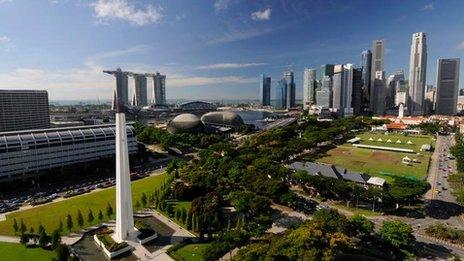How does a country become rich?
- Published
- comments

How does a country become rich?
Singapore is one of only a handful of countries to have managed it in the past half century. A colonial outpost now has the third highest average income in the world. How did it do it? And why are social tensions now showing?
It may surprise you to know that Singapore has more millionaires per capita than anywhere else in the world. One in six households are in the millionaire club. They come to this city-state by design. The government offers low taxes, raising their revenues through a property tax on the expensive, multi-million dollar houses of the ultra-rich. In return the rich spend - boosting the local economy's shops, restaurants and even a Universal Studios.
A key reason that expats are attracted is the quality of life.
Even middle class workers like teachers live well there - they can join sailing clubs and enjoy the services of a maid. A good environment and a world class secondary school system populated by foreign teachers help Singapore to attract the best talent from around the world.
It is a city-state with about five million people so the scale isn't comparable to the challenges of a country.
That makes its ability to be a large manufacturer all the more surprising. An analogy would be if London or New York had large factories alongside an international financial centre.
Manufacturing accounts for more than one-fifth of the economy, which is a larger share than in Britain and the US.
But, how does a rich country remain integral to a cost-competitive global production chain? The answer is by producing at the high end: half of its exports are high tech goods. Singapore started at the low end of manufacturing but managed to upgrade its skills so that it didn't fall out of the regional production chain as its incomes rose.
Plugging into global trade as a high income country requires high level skills - and that's what the government has achieved by upgrading the skills of the workforce through investing in expanding higher education and training. Singapore has some of the top secondary schools in the world, and the government has recently targeted teaching design to imbue every profession such as engineering with some element of creativity. It helps to increase the skill base.
In addition, skilled workers also come from all over the world. Extraordinarily, two out of five people in Singapore are foreigners. Bankers and others in the financial industry have moved to what has become the Switzerland of Asia.
But, does that mean that the excesses that felled the Western financial system could exist here?
There are of course those who are not doing as well. For Singaporeans who are working in blue collar jobs, the arrival of lower paid foreigners creates social tension. There are concerns over congestion in public transport and housing.
Those worries were one of the reasons that the government lost a few seats in parliament during the last election.
Singapore's transformation has been extraordinary. A country where the official languages are English, Tamil, Malay, and Chinese is rather useful for global business. It is not accidental.
Singapore made itself an internationally oriented economy and that has largely paid off for its people. Cracks are showing in the orderly facade -- but for most people, their working lives have benefitted.
I present the flagship Working Lives Singapore on BBC World TV and bbc.com. Details at: bbc.com/singaporedirect.